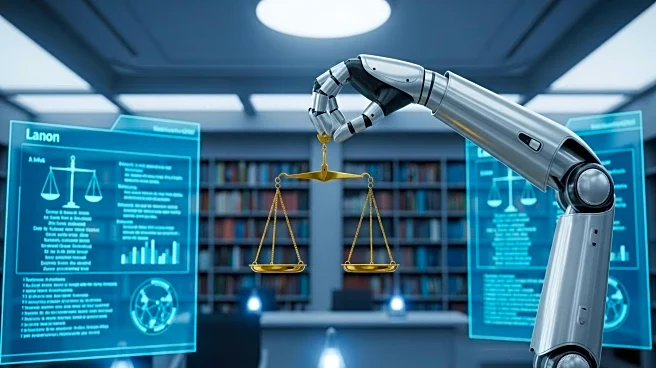What is the story about?
What's Happening?
Harvey, an AI platform, has successfully expanded its presence in several top law schools in the United States. Initially adopted by Stanford, UCLA, NYU, and Notre Dame, Harvey has now been integrated into the programs of additional prestigious institutions such as the University of Chicago, University of Pennsylvania, Vanderbilt, Washington University in St. Louis, Boston University, Fordham, Brigham Young University, University of Georgia, Villanova, Baylor, and Southern Methodist University. This expansion marks a significant step in incorporating advanced technology into legal education, aiming to keep future lawyers at the forefront of legal tech. The AI's integration into these schools is seen as a potential game-changer for legal education, providing students with cutting-edge tools to enhance their learning experience.
Why It's Important?
The integration of Harvey AI into top law schools signifies a shift towards embracing technology in legal education. This move could potentially reshape how law is taught, offering students new ways to engage with complex legal concepts and prepare for a tech-driven legal landscape. The adoption of AI tools like Harvey may influence the rankings and reputations of these institutions, as they strive to remain competitive and innovative. For students, this development offers an opportunity to gain proficiency in legal technology, which is increasingly important in the modern legal profession. However, there is also a risk that reliance on AI could impact traditional learning methods and the development of critical thinking skills.
What's Next?
As Harvey continues to expand its presence in law schools, it will be important to monitor the impact on both student outcomes and institutional rankings. Schools that have adopted the AI will need to assess its effectiveness in enhancing legal education and whether it provides a competitive advantage. Additionally, other law schools may consider integrating similar technologies to keep pace with these developments. The broader legal industry will likely observe these changes closely, as the integration of AI in education could influence hiring practices and the skills expected of new graduates.
Beyond the Headlines
The adoption of AI in legal education raises questions about the future role of technology in the legal profession. As AI tools become more prevalent, there may be ethical considerations regarding their use in legal practice, such as issues of bias and accountability. Furthermore, the shift towards technology-driven education could lead to long-term changes in how legal professionals are trained, potentially affecting the traditional law school model. These developments may also prompt discussions about the balance between technological proficiency and foundational legal skills.
















